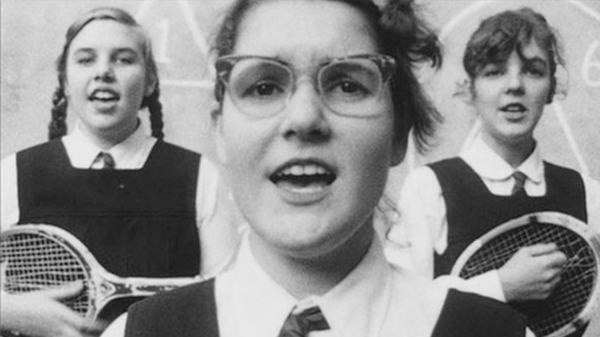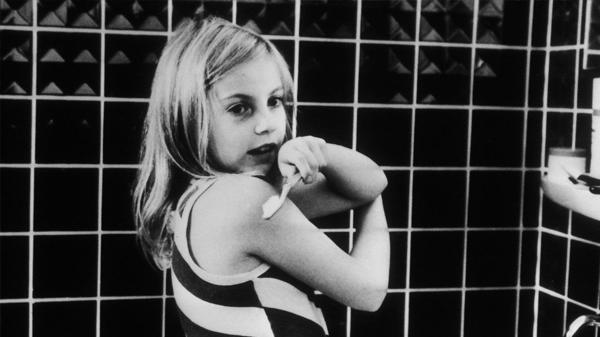READ ME is a platform for female-led writing on film hosted by Girls on Tops. Louisa Maycock (@louisamaycock) is Commissioning Editor and Ella Kemp (@efekemp) is Contributing Editor.
What do Kelly Reichardt, Jane Campion and Hirokazu Kore-eda have in common? After its third and final edition, Nicole Davis looks back lovingly on the subversive sanctuary offered by the Overnight Film Festival in Eastbourne.
“We are all just prisoners here, of our own device.”
The Eagles might have been referring to the Hotel California, but these lyrics apply just as easily to guests of the Queens Hotel in Eastbourne, who, at the beginning of February, descend on its bedrooms and ballroom for the Overnight Film Festival. Cinephiles and carousers alike gather for a two-to-three night stay, imbibing cult classics and obscure filmic discoveries programmed across the weekend with the intention of expanding their horizons beyond a faintly derelict pier.
The third and final edition of the festival began with Kelly Reichardt’s barely-seen directorial debut River of Grass, a sombre sojourn across Florida’s Everglades punctuated by slapstick hilarity and deadpan narration. The seeds of Reichardt’s cinema of discontent are sown with her protagonist. An ennui-afflicted housewife, Cozy is looking for distraction and potentially trouble. She finds both in Lee, a hapless, feckless, but friendly-enough guy who convinces Cozy to break into a swimming pool and then to hit the road with him after they convince themselves they’ve shot the owner. River of Grass is much more restless than Reichardt’s subsequent films, which exhibit a stillness and sadness that has since become her trademark.
With its drum-heavy score, observational segues, shots of Cozy performing cartwheels and comedic riffs (as when Lee gears himself up to rob a convenience store, only to be pipped to the post by a fellow bandit), Reichardt’s film has the flavour of Badlands, the tonal influence of Tarantino and shares a slacker mentality with Wes Anderson’s Bottle Rocket. It’s as if her boundless ideas are ricocheting around the screen, flirting with motifs to be distilled and deployed to later and always greater effect. Indeed, Cozy and Lee’s meandering, peripatetic lifestyle and poverty-plagued misdeeds share a connective tissue with much of her later work.
Closing the festival, as a primer for Věra Chytilová’s factory-girl film A Bagful of Fleas came Jane Campion’s defiant student short film A Girl’s Own Story. As the programme had thus far already prepared our palates for experimentation, Campion’s disavowal of chronology and cuteness brought the festival’s intentions into sharp relief. The film follows three friends who attend a Catholic girl’s school in 1960s Sydney, set against a backdrop of Beatlemania and burgeoning female sexuality. The choice of a fragmentary style as a means of exploring the female psyche is something that would come to define Campion’s oeuvre.
In programming these formative yet forsaken works in the careers of now canonized female filmmakers, Overnight allows a space for the experimental, rough-edged and freewheeling. In a world that incessantly demands a higher standard for female artists, it’s a festival that celebrates incarnations of the imperfect. These women did not catapult themselves into legend out of the gate; they played, polished and persisted. It’s doubtful that Certain Women would exist without River of Grass, The Piano without A Girls’ Own Story. A career is made of components, misfires and sensations alike, and to revisit or discover the early work of women in particular is to dispute the idea of an overnight success, and how success as a goal is defined. A film doesn’t have to win awards for its impact to be felt. It can be just as resonant when screened decades after its release.
Earlier editions of the festival, which began in 2016 as a riff on All Tomorrow’s Parties (an intimate and independent music festival in which organisers and artists reside side-by-side with ticket holders), sought to programme female filmmakers exclusively. The inaugural run saw screenings of Pariah, Eve’s Bayou, Wanda and Bad Hair curated by Emma Dabiri, Ariane Labed and Jenn Nkiru.
The programming now leans towards the footloose feel of the festival itself, where attendees come and go as they please and in which none of the screenings are compulsory. If you wish to lounge in the DVD room (styled like a South Korean ‘DVD bang’ – a one-room pop-up cinema fitted with cushions and designed for relaxation) gorging on the back catalogues of Studio Ghibli and Harmony Korine, be their guest. The second and final editions of Overnight opted to exhibit cult classics from artists working outside the mainstream, alongside early works from seminal directors such as Todd Haynes and Claire Denis and, this year, Hirokazu Kore-eda.
A screening of the Japanese director’s 2008 drama Still Walking is an experience unlikely to be replicated anytime soon given its projection on 35mm film. Interweaving poignant conversations with scenes of food being painstakingly prepared and consumed – the ritualistic nature of which matches the very reason the grieving family at its centre have gathered – Kore-eda’s slow and sumptuous style is a foolproof match for the languorous vibe of the festival. The mechanical whir as the celluloid pistons through the projector and the granular texture of the film, like seeing your grandparents frayed and sepia-toned holiday photos emerge from a shoebox, underscores the film’s exploration of memory and legacy.
Where most festivals compete to host world premieres, and a film then competes to be seen, heard, and well-reviewed so that a bidding war might ensue, Overnight is a caesura in the commercial chaos. Eastbourne is therefore the ultimate host. A destination known for its senior residents, toasted teacakes and scenic coastlines, it operates at a slower pace than city-dwellers are used to. Likewise, the hotel is a nostalgia-bathed haven, sitting somewhere between Grand Budapest and The Shining, with its serpentine corridors carpeted in red and many-windowed pastel facade.
Don’t mistake this laidback coastal insouciance for a lack of care. Mindful programming is at the heart of this labour of love. This year’s binding ingredient was arguably the ‘journey’ film. Before it’s pointed out that all films, technically, consist of a journey, many of those programmed this year contain a physical odyssey, as in Michal Marczak’s All These Sleepless Nights, a roaming quasi-documentary that sees two friends lather-rinse-repeating a series of parties, aimless nights, and city-drifting. Likewise, Sunday afternoon’s film Alice in the Cities (directed by Wim Wenders) is a dazzlingly-shot buddy-movie set on the road in 1970s America and Europe. This programmatic through-line provides an even greater opportunity for consideration and reappraisal. Whether at the curatorial salons (think of them like university seminars, without the pressure to partake, or the academic veneer), communal dinners or on a bracing seaside stroll, the point seems to be to pontificate.
The ethos behind Overnight is one other festivals could do well to adopt, particularly in an era of quotas and statistics. Of course, Overnight is a distinctive breed of festival, less besotted with growth and male privilege than, say, Cannes (although their promenades bear a passing resemblance). And yet, take a leaf out of Overnight’s manual on ‘how to organise a film festival’ (currently an imaginary publication) and you’ll find yourself less inclined to look for the next big thing, more willing to appreciate the undervalued gems that the industry has already cultivated.
In their memoir She Wants It, Jil Soloway refers to writer and media critic Lili Loofbourow’s quote on the male glance:
“A reviewer can say ‘meh’ and a career stalls out. Men reserve these whooshing genuflections for their bros, their nerd buddies. Lili Loofbourow writes about this male glance, this disdain for our work: the male glance is the opposite of the male gaze. Rather than linger lovingly on the parts it most wanted to penetrate, it looks, assumes and moves on.”
The Overnight Film Festival is about looking back, and this notion of “lingering lovingly” seems to encapsulate that perfectly. The festival’s very name suggests that we sleep on our opinions. In its mellow, moon-festooned environment, it asks us to consider or reconsider the careers of these women filmmakers, as if operating as a sanctuary for a sadly endangered species. It’s a place where subversive films can be screened without fear of reproach, in which failure (by box office standards) is a sign of fearlessness. I came away from the weekend feeling grateful that these women, against the odds, had reached for the stars.
Nicole Davis (@stonecoledfox) is a freelance writer based in London. She has written for Little White Lies, i-D and the BFI.




